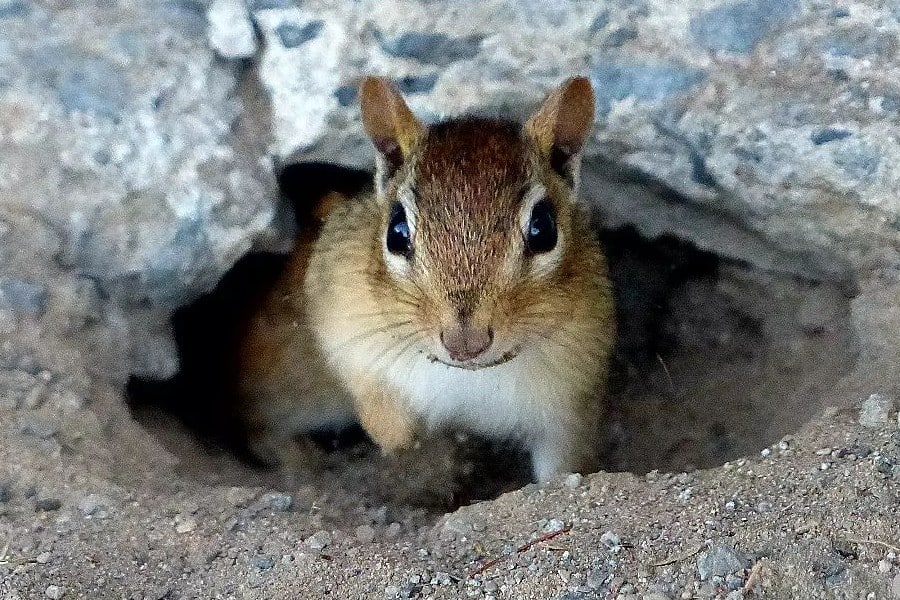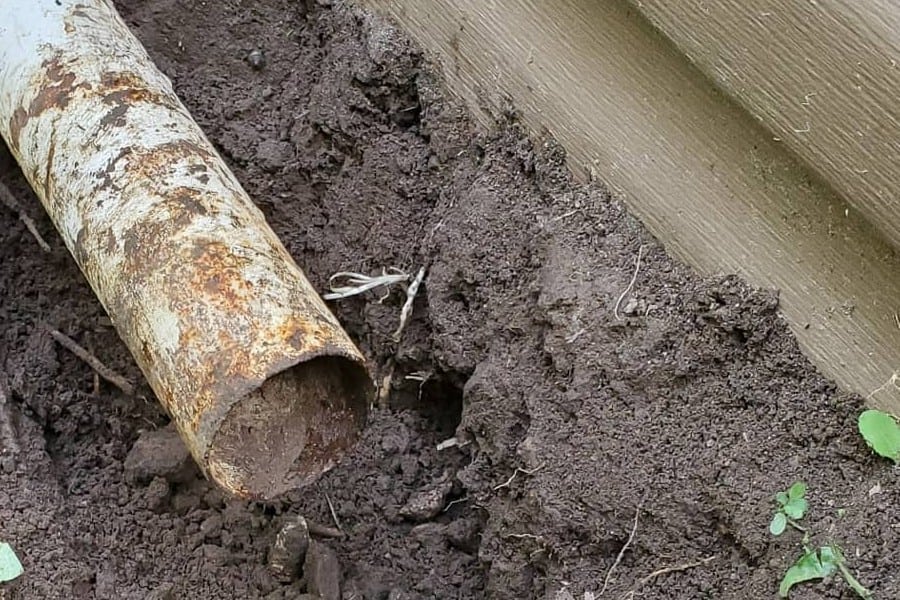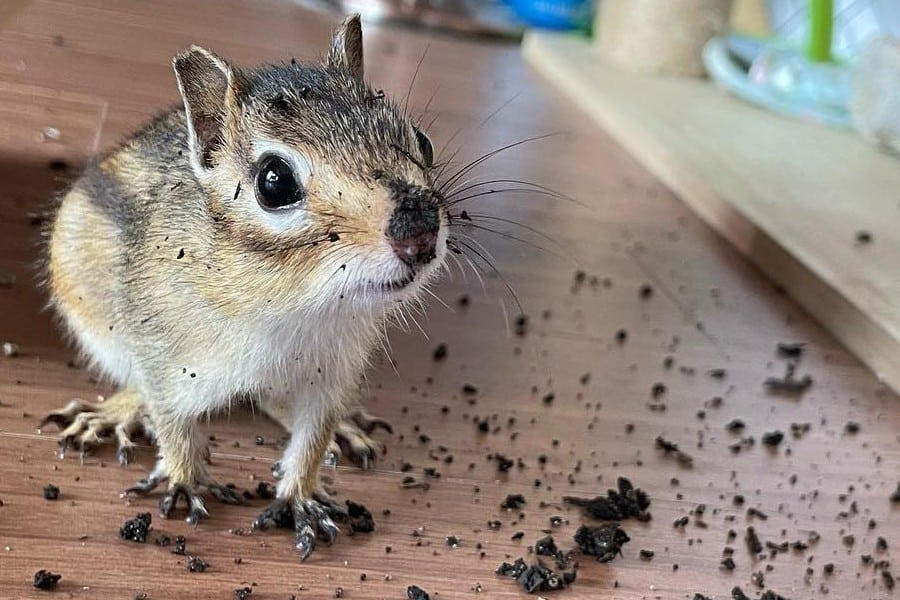Chipmunks are cute animals that look like squirrels but with stripes. They seem harmless until they settle in your yard. Striped squirrels are capable of digging fairly deep burrows. Once they have infiltrated your garden, chipmunks begin to destroy your plants. They are even capable of making holes in the foundation of your home.
Should I say that rodents are disease carriers? As soon as you see the first burrow in your garden, you know you have a problem that urgently needs to be dealt with. In this article, I will tell you how to seal a chipmunk hole.
[wpsm_titlebox title=”How to Seal a Chipmunk Hole?” style=””main””]
- Check your yard for holes in the ground.
- Ensure they are chipmunk tracks.
- Learn techniques that help control them.
- Take preventative measures to keep rodents away from your yard.
- Get rid of their holes.
- Make sure pests can’t get into your home.
- Inspect the yard regularly to make sure a chipmunk has not dug new burrows.
[/wpsm_titlebox]
What Do Chipmunk Holes Look Like?

The tiny size of the chipmunk makes you think that its burrow is also a small hole in the ground. In fact, it is a whole system of tunnels. The entrance to a chipmunk burrow is different from, for example, a mole hole or an ant one. This rodent digs the hole from top to bottom, so you won’t find a slide of the earth around the hole.
When the chipmunk starts digging a hole, it first makes a tunnel parallel to the surface of the ground, and at the end of the tunnel, it equips a burrow. These pests, like humans, eventually seek to make their dwellings more spacious. They build additional tunnels and burrows where they store their grain, breed, and hibernate for the winter.
A burrow can be up to three feet deep and thirty feet long. Externally, the chipmunk’s burrow can be recognized by its flat opening.
How many chipmunks live in a burrow?
If you see a burrow in your yard, you might think that at least a dozen rodents live there. But they don’t. Chipmunks never live together. There are no exceptions: One burrow is one chipmunk. Rodents can sometimes be near each other, but that does not mean they live together.
Only danger can make them fuse for a while. If a chipmunk realizes that it is in danger, it starts making distinctive sounds that other chipmunks should recognize.
Even after mating, these rodents never stay together. When a female chipmunk gives birth, the cubs stay with it for only a month and a half and then leave to dig their burrows.
How to Seal a Chipmunk Hole

If you have a chipmunk in your yard, you should use humane methods to get them to leave your property. Don’t wait for the rodent to start destroying your garden. You can be proactive and check your yard for burrows. Inspect your garden and make sure there are no holes 2-3 inches in the ground. Check more enclosed areas, such as under stairs, near decorative rocks, and other items. If you find signs of chipmunks, follow one of the methods I describe below.
Method 1: Fill in the hole
Because these rodents dig a hole from top to bottom and don’t leave soil at the entrance to the burrow, it is harder for them to find a hole in the ground afterward. One way to get rid of chipmunks is to backfill their burrows. You can pound the underground passages with earth. But since these pests easily dig the ground, it’s best to cover the former entrance with something heavy, like a rock.
To prevent the chipmunk from digging a hole in the same place again, you can fill the hole with gravel or cement the hole at all. But note that if it is a lawn or garden area, no more plants will grow in this place. To keep plants from growing, you can mix the soil with gravel and fill the hole with this mixture. Chipmunks will have a hard time digging in a place where there is rock, and plants will be able to get through.
Method 2: Close the entryways to the house

Chipmunks can try to get into your home, especially during the colder months. Check your house for possible cracks and holes. Even though rodents live in the ground, they can easily get into your home through the roof. You can close cracks with special sealants. If you find a large hole that a sealant can’t handle, try cementing it in.
Also, pay attention to all the ventilation grids. If they are in bad condition or absent at all, you should replace them. Be responsible for the choice of grids; be sure to consult a specialist. Improperly selected nets can disrupt the ventilation system.
Method 3: Protect your yard from chipmunks
If you have already noticed a chipmunk in your yard or have just moved into a new home and want to prevent them, these tips should help you:
- Properly positioning your fence will prevent rodents from tunneling into your property. The fence should not have holes that are too large and go at least 8 inches deeper into the ground. If your fence has been in place for a long time and you don’t plan to change it, you can dig in some mesh as extra protection;
- Use special chipmunk traps. Just be aware that some areas do not allow trapping of these rodents. Find out this information in advance. If there are no restrictions in your area, you can buy a special trap and set it in places where you have already encountered chipmunks. Be patient, and do not rush to catch the rodent. You can lull his vigilance and set the trap with baits so that it will not close. When you realize that the chipmunk regularly comes to the cage to eat, you can activate the trap;
- Chipmunks are afraid of predators such as foxes and coyotes. You can buy products with the scent of these animals’ urine at a special garden store and treat any openings through which a chipmunk might leak. The procedure should be repeated every 2-3 weeks;
- If you have cats or dogs, let them take more walks in the yard. This will also deter chipmunks;
- If you have bird feeders on the trees in your yard, make sure they don’t hang too close to the house. Chipmunks love to eat the grain you pour for the birds, so they can climb into the feeders and enter your house from there. Don’t pour too much grain, so it won’t fall to the ground and attract rodents.
Methods That Don’t Help Get Rid of Chipmunks

If you search the forums on the Internet for methods of fighting chipmunks, you can find information that advises flooding burrows with water. Pouring water in the chipmunk hole does not help to fight rodents. Moreover, you should not pour gasoline or other aggressive substances into the burrows.
FAQ About Chipmunk Burrows in the Yard
So, you’ve learned some useful ways to help you get rid of the problem of pests in your yard. You have also found out which methods are ineffective, such as flooding chipmunk holes. Below, you will find answers to common questions that will help you control chipmunks.
What smells do chipmunks hate?
Chipmunks do not tolerate all pungent smells. In addition to the remedies we have mentioned above, you can use coffee, garlic, cayenne pepper, vinegar, ammonia, and naphthalene balls to repel rodents.
What time of day are chipmunks active?
Chipmunks like to climb trees, but despite that, they spend most of their time on the ground or underground. Their activity peaks in the early morning and late evening.
Can chipmunks damage the house foundation?
Chipmunks can do it, but it is unlikely. When their system of underground passages grows, they might end up under your house. This will lead to soil erosion at the foundation.
Chipmunks Have No Place in Your Yard
If you have chipmunk holes in the ground, don’t despair. There are many humane methods to help you protect your property from these pesky rodents. Be patient, be cunning, and don’t let chipmunks ruin the plants and soil in your garden.
Have you faced the problem of chipmunks in your yard? Share which methods you used to get rid of them.

